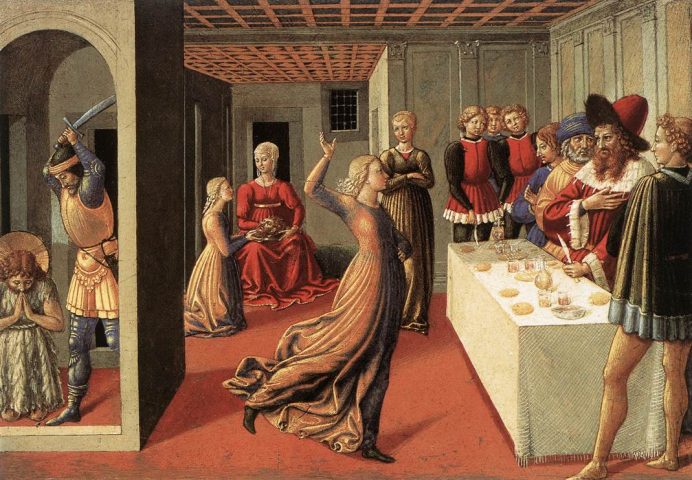Martha, Mary, and Myers-Briggs, by Deacon Greg Lambert
August 30, 2019Fr. John Horgan: What Are the Nine Choirs of Angels?
August 30, 2019
By Msgr. Charles Pope, Aug. 29, 2019
The Memorial of the Passion of St. John the Baptist celebrated on Thursday speaks to a critical issue in our times. Herod both resisted and violated his own conscience; he feared the opinion of the crowd more than that of God, ordering the hideous and unjust murder of John the Baptist. Unfortunately, such acts are commonly committed by some leaders and others who compromise with evil in order to survive and flourish in an evil world. The reason for John’s imprisonment and murder is what makes his death a lesson, particularly for our age.
Simply put, St. John the Baptist died because he told Herod Antipas that his “marriage” to Herodias was invalid and sinful. Herod Antipas had divorced his first wife, Phasaelis, so as to be able to marry Herodias, who had been married to his half-brother Herod II (also known as Herod Philip I). The situation is described in Scripture:
For Herod himself had ordered that John be arrested and bound and imprisoned, on account of his brother Philip’s wife Herodias, whom Herod had married. For John had been telling Herod, “It is not lawful for you to have your brother’s wife.” So Herodias held a grudge against John and wanted to kill him. But she had been unable, because Herod feared John and protected him, knowing he was a righteous and holy man (Mark 6:17-20).
Herod eventually yielded to the machinations of Herodias, and John the Baptist was murdered for upholding the sanctity of marriage. Jesus would later affirm John’s teaching and say,
Whoever divorces his wife and marries another woman commits adultery against her. And if a woman divorces her husband and marries another man, she commits adultery (Mark 10:11-12).
Jesus suffered rebuke, even from his disciples (cf Matt 19:10), for teaching this (cf Matt 19:7), but He withstood them and rebuked their error (cf: Matt 19:8-9). St. John the Baptist died for this teaching, as did St. Thomas More and St. John Fisher.
Today there are many, even within the Church up to the highest levels of authority, who are willing to set aside or compromise this teaching, making sacramental accommodations never before imagined. While not every civil marriage is a sacramental marriage, and the church should be willing to hear evidence and potentially grant annulments in such cases, we cannot water down the Lord Jesus’ unambiguous teaching, a teaching these saints died to defend.
It is not simply an error to supplant this ancient teaching of the Lord—it is a grievous error. It is grievous because, intentionally or not, it diminishes the deaths of these glorious martyrs who loved and revered God too much to flatter men, even powerful ones. They suffered for this truth in a way that most today are not willing to suffer. This teaching, as the disciples imply, is a hard one (Matt 19:10), but how can we set aside something that Jesus insisted upon and for which these martyrs died?
The Church must have a pastoral stance for the divorced and remarried through a willingness to investigate their situations and grant annulments where appropriate. Further, we can recognize that not all situations are the same; not all acted in bad faith or with malice. However, we cannot set aside the truth of the Gospel to do this. Sometimes the answer must be that we cannot, at this time, extend the sacraments to them. We can still hold them close and encourage them to pray, attend Mass, and beseech God, until such time as they are willing to live as brother and sister. We can do nothing less because Jesus teaches this clearly.
At the Memorial of the Passion of St. John the Baptist, we do well to remember and cling to the truth for which he died.




